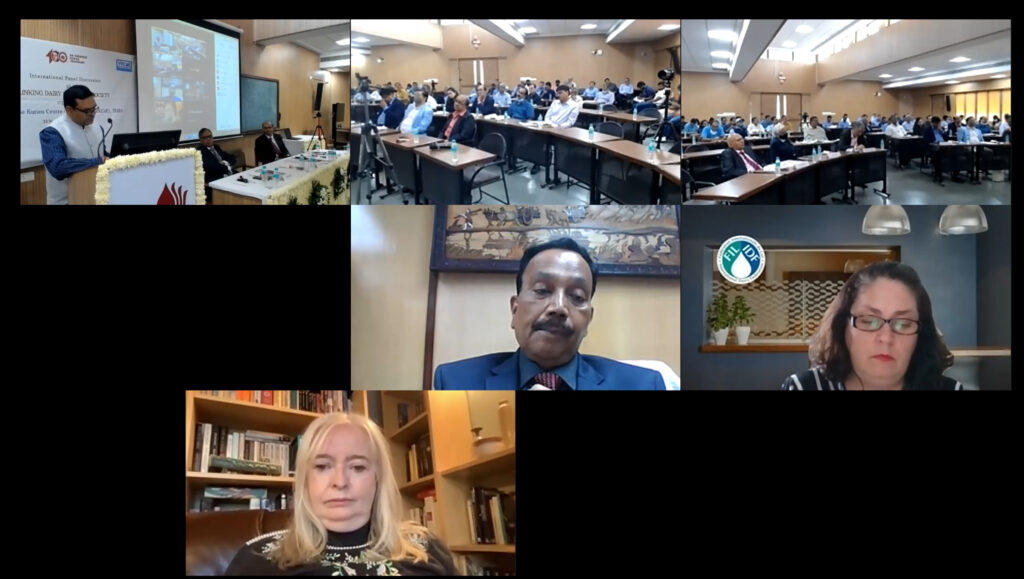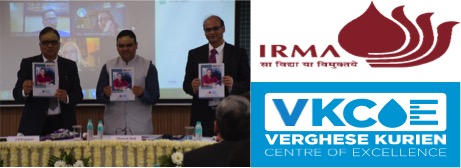An international panel discussion titled ‘Linking dairy science to society’ was organized on 24 November 2021 by Verghese Kurien Centre of Excellence (VKCoE) as part of the ongoing Birth Centenary celebrations of Dr. Verghese Kurien, dubbed ‘The Kurien Mahotsav’ at IRMA. Conducted in a hybrid mode, the basic objective of the session was to discuss contemporary issues related to dairying in India and make strategic plan to take the dairy industry to a next level. The discussion was graced by many eminent dignitaries of the dairy sector of both national and international repute where about 60 delegates were physically present and many were connected virtually.
Prof. Umakant Dash, Director, Institute of Rural Management Anand initiated the discussion with the welcome address. Like each year, the centre released the Verghese Kurien Centre of Excellence Information Brochure 2021. The discussion was chaired by Shri Meenesh Shah, Chairman, National Dairy Development Board (NDDB). The virtual presenters were Ms. Caroline Emond, Director General, International Dairy Federation, Brussels, Ms. Judith Bryans, Chief Executive of Dairy UK and Dr. Anil K. Srivastava, President, National Academy of Dairy Sciences (India) (NADSI) and member, Agricultural Research Scientist Board (ARSB).

Shri Meenesh Shah, Chairman, National Dairy Development Board (NDDB) in his opening remarks highlighted the advances that the dairy sector has seen over the past few decades. He introduced that Indian dairy is about providing milk and milk products to the consumers in general and children in particular. Shri Shah said dairy science has improved livelihoods of millions of small and marginal dairy farmers through various interventions in milk production and in the field of animal husbandry, agriculture and dairy technology. He called for the augmentation of ration balancing, sex sorted semen, embryo transfer technology, ethno veterinary practices and animal identification. His proposed recommendations were as follows: Science to be brought to the doorstep of dairy farmers and dairy industry, application of science through cross sectional subjects including animal husbandry, agriculture and dairy technology, in an amalgamated manner where necessary, should be encouraged, benefits of circular economy to be recognized and promoted and augmentation of relevant policies to encourage increase in operational efficiencies and reduce environmental impact of dairying activities and welfare of dairy farmers to be the focus of the relevant government policies.
This set the tone perfectly for Ms. Carole Emond, Director General, International Dairy Federation, Brussels who spoke on “Challenges and opportunities in dairy sector”. Few points on policies from her presentation includes recognizing the contribution of dairy to the UN Sustainable Development Goals, promoting the role of dairy in healthy diets and sustainable food systems, supporting research and innovation and promoting the science behind dairy, including the promotion of science to women and girls, maintaining strong support and funding to School Milk Programs, ensuring science-based policies, integrating Codex Alimentarius dairy standards into national regulation and monitoring implementation of the standards, particularly on food safety.

Ms. Judith Bryans, Chief Executive of Dairy UK’s presentation on “Contributions of dairy in nutrition and health” highlighted the role that dairy plays in achieving the first and second UN Sustainable Development Goals of no hunger and no poverty. She also highlighted the challenges and opportunities that lie ahead of the dairy sector. Ms. Judith carried forward the discussion by bringing to light the changing global demographics. She brought to attention that people across ages want safe, affordable, and nutritious food and dairy products and primarily milk fulfill all these criteria.
While both the presentations called for increased production of milk, the question, ‘how to achieve it while maintaining the GHG emissions targets of COP26?’ still remained unanswered. This was answered by Dr. Anil K. Srivastava, President, National Academy of Dairy Sciences (India) (NADSI) and member, Agricultural Research Scientist Board (ARSB) wherein in his presentation “Heading towards carbon neutral dairying”, he discussed various techniques that would cut down on the GHG emissions arising from the dairy sector. He suggested that carbon neutral and climate smart dairying is the future and if not taken with care, dairying will negatively impact the environment especially in arid and semi-arid regions.
The insightful presentations were followed by a panel discussion that focused on challenges that the dairy industry faces in the wake of changing consumer preferences towards plant-based substitutes to milk products. Prof. Dr. Rakesh Mohan Joshi, Dean, Indian Institute of Foreign Trade (IIFT), New Delhi, the renowned dairy consultant Dr. JV Parekh, the Editor-in-Chief, Dairy Times magazine and Shri Kuldeep Choudhury, General Manager, Operations, Amul Dairy were amongst the panelists who were virtually joined by Dr. A. K. Singh, Principal Scientist, Head of the department, Dairy Technology Division, ICAR-National Dairy Research Institute, Karnal and Dr. Bharati Kulkarni, Senior Grade Deputy Director, Clinical Division, ICMR-National Institute of Nutrition, Hyderabad. The panel discussion was moderated by Shri Kuldeep Sharma, Founder, Suruchi Consultants.

The panel discussion called for the generic promotion of milk and dairy products communicating the benefits to the consumers and that the dairy industry should come together to fight against challenges posed by plant based products and vegan groups. Inclusion of school children and college students in the FSSAI committee for the future foods was welcomed by the panelists. The closing statement by the moderator called for increasing the legitimacy of the dairy industry and its products because without authenticity there would be no food safety and hence no food security. The vote of thanks was given by Dr. J. B. Prajapati, Chairperson, Verghese Kurien Centre of Excellence. The programme was well coordinated by the research fellows of Verghese Kurien Centre of Excellence – Dr. Pankaj Parmar, Shri Ankit Sontakke and Shri Darshan Patel and hosted by Dr. Smruti Smita Mohapatra.
Source : Team VKCOE Dec 7 2021

